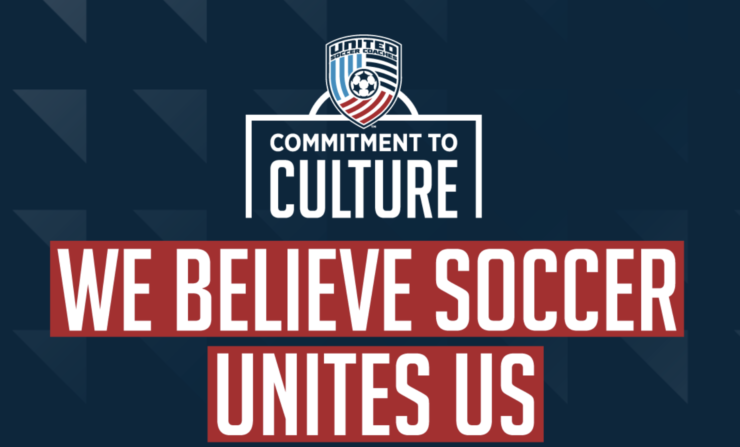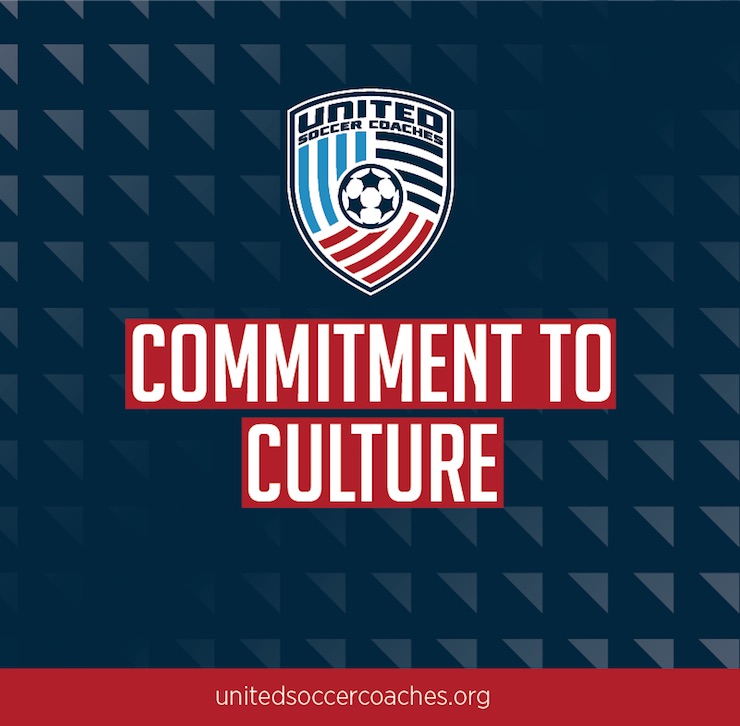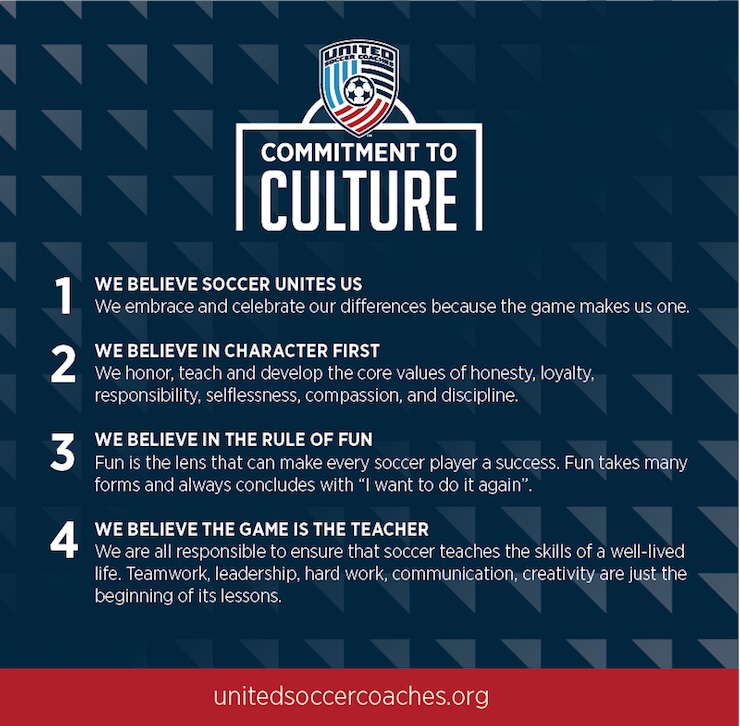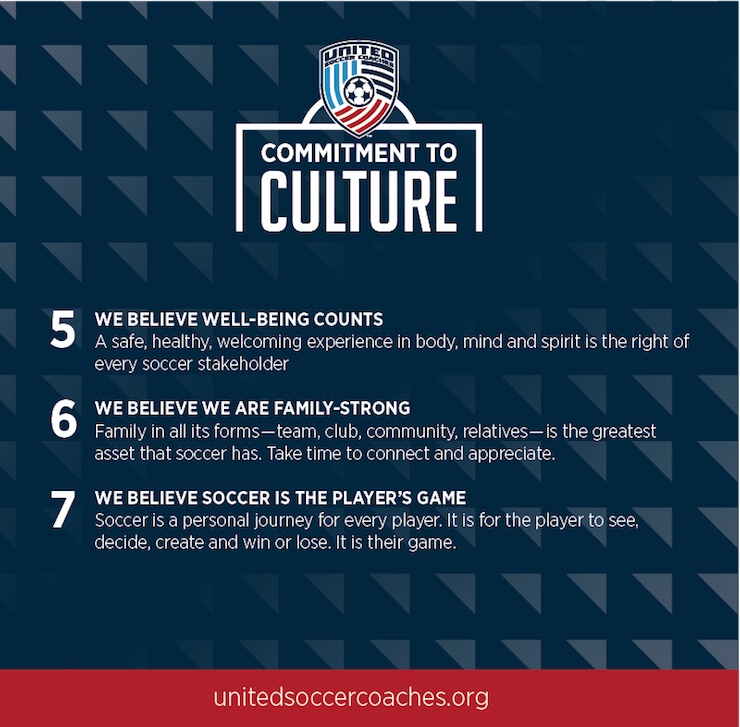United Soccer Coaches Unveils ‘Commitment to Culture’
Making change happen: Uniting soccer coaches around the love of the game sparks a new focus on culture.
As the unifying voice, advocate, and partner for soccer coaches at all levels, United Soccer Coaches has just announced their initiative to build a modern and effective soccer culture for our country.
Soccer News: United Soccer Coaches today unveiled the “Commitment to Culture” — a pledge to build a unique, positive soccer culture in America.
Consisting of seven cornerstones developed by soccer coaches, the Commitment to Culture celebrates what is best about the world’s best-loved sport. The idea is to accept a framework of fundamental beliefs that the coaching community collectively can support and strive to achieve.
United Soccer Coaches Commitment to Culture
We Believe…
- Soccer unites us. We embrace and celebrate our differences because the game makes us one.
- Character first. We honor, teach and develop the core values of honesty, loyalty, responsibility, selflessness, compassion, and discipline.
- The rule of fun. Fun is the lens that can make every soccer player a success. Fun takes many forms and always concludes with “I want to do it again.
- The game is the teacher. We are all responsible to ensure that soccer teaches the skills of a well-lived life. Teamwork, leadership, hard work, communication and creativity are just the beginning of its lessons.
- Well-being. A safe, healthy, welcoming experience in body, mind, and spirit is the right of every soccer stakeholder.
- We are family strong. Family in all its forms – team, club, community, relatives – is the greatest asset that soccer has. Take time to connect and appreciate
- Soccer is the player’s game. Soccer is a personal journey for every player. It is for the player to see, decide, create and win or lose. It is their game.
The seven cornerstones are the outcome of a strategic coaches’ summit held at the 2018 United Soccer Coaches Convention in Philadelphia. Coaches representing all levels of the game – pro, college, high school, competitive and recreational – came together to examine the soccer culture after the U.S. Men’s National Team failed to qualify for the 2018 World Cup and amid reports of declining soccer participation numbers.
Clearly, It’s Time: To Commit to America’s Soccer Culture.
SoccerToday’s interview with United Soccer Coaches CEO Lynn Berling-Manuel
Diane Scavuzzo: Can you tell us about United Soccer Coaches’ new Commitment to Culture and the seven cultural cornerstones which were announced today?
Lynn Berling-Manuel: Sure. Le’s first take a step back. A year ago today, on October 10th, the USA was knocked out of the World Cup in Trinidad. It was a devastating moment for everybody in American soccer. We were left reeling.
After we failed to qualify, we watched soccer people turn on each other.
There was a lot of finger pointing asking why did American soccer fail. What floated to the top very quickly was the importance of focusing on player development. However, all around the globe — every federation, every league, every team — has spent millions of dollars on player development, and no one has come up with a magic bullet.
At United Soccer Coaches, we took a step back and said, “Maybe we should look at this differently.” Obviously, player development continues to be incredibly important but we believe to reach our goals, we also need to focus on cultural development.
Others have said, “Well there just needs to be better coaching education.” We think there’s a lot of really, really good coaches in America and while everybody is on board with improving coaching education, we also believe there needs to be a cultural education.
Diane Scavuzzo: What does an American soccer culture need to look like for the USA to be successful?
Lynn Berling-Manuel: I believe there needs to be a culture of soccer participation.
All the credible research tells us that, year-over-year, soccer participation has been declining. It’s indisputable, actually.
While we still have plenty of kids percolating to the top of the pyramid, at the bottom, kids are leaving younger and faster than any other team sport in America. This should be a concern to us all.
We believe coaches have to be the agents of change.
United Soccer Coaches reached out to coaches across all levels of the game to come together for a summit held at the United Soccer Coaches Convention in Philadelphia. We asked these coaches to spend the day in the middle of the convention, to take themselves off the floor and out of all the other workshops, and spend the day really thinking about this issue. We brought in a professional facilitator. Out of that work came the beginnings of the cultural cornerstones and this commitment to culture.
Diane Scavuzzo: Which of the seven cornerstones is your favorite?
Lynn Berling-Manuel: Absolutely the rule of fun. All of them are frankly really important, but there’s a very high tendency to suck the fun out of the game.
Diane Scavuzzo: How do you define fun?
Lynn Berling-Manuel: For some, hard work can be fun. Being successful can be fun. For a pro player, the definition of fun is quite different than the definition of fun for a six-year-old.
But at the end of the day, you know you’ve been successful when the player, regardless of their age says,
“I want to do it again. This was really great.”
Diane Scavuzzo: How long have you been involved in the world of soccer?
Lynn Berling-Manuel: About 40 years.
Diane Scavuzzo: In the 40 years – that’s a remarkable amount of time ….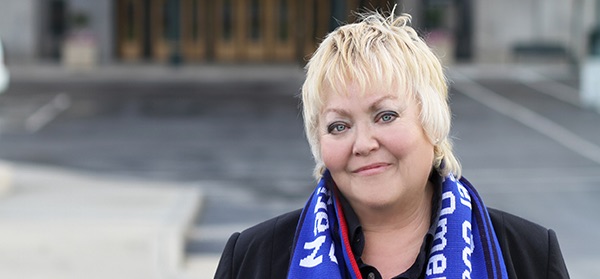
Lynn Berling-Manuel: It’s a shocking amount of time. Even the word forty is horrifying.
Diane Scavuzzo: In all these years, has soccer ever been fun?
Lynn Berling-Manuel: I think that as the stakes are higher now and it’s become less fun for many players
Diane Scavuzzo: Why are the stakes higher now than they were before? Is there just more pressure?
Lynn Berling-Manuel: I think there’s more opportunity. Soccer used to be a small tribe. Everybody was in it together. You always felt that other soccer people were cool because there wasn’t a lot of us around.
I would say the biggest change in 40 years, and it’s very good in many ways, as well as difficult and challenging in others, is that soccer has become a big business.
Diane Scavuzzo: Which do you think is the hardest cornerstone to implement?
Lynn Berling-Manuel: The funny thing is that it might be ‘We are family strong.’
We all hear all too often coaches say, “Well if we just didn’t have to deal with parents, all of this would be so much easier.” We’d like coaches to feel that it’s important to communicate well with parents, to help parents understand the decisions they are making and what they’re doing. Parents can’t just be the people who pay the bills. They can’t just be the financial reservoir. They have to be part of our game and our process.
Diane Scavuzzo: I also really like ‘Soccer is the player’s game.’
Lynn Berling-Manuel: Yes. Grownups and nonplayers have a tendency to forget how much soccer is a player’s game.
What makes soccer truly unique as a sport is how incredibly creative it is for the player. The player decides once they’re out on the field. Every decision is a player decision. Coaches have virtually no say so once the game is going.
It about the player’s creativity, this is why it’s such a phenomenally popular game.
Diane Scavuzzo: What needs to change to avoid not qualifying again?
Lynn Berling-Manuel: The reality is, on any given day, the greatest team in the world against the worst team in the world could still lose.
That’s just the game.
I’m a big believer that we need to have a much more successful scouting system. I think there’s great talent in this country. I think we have to make sure that you don’t have to be an affluent suburban kid to be successful.
Diane Scavuzzo: What are your goals in terms of outreach with your cornerstones?
Lynn Berling-Manuel: This is actually a very long-term initiative for us. In 2019, we will launch a platform that allows coaches to share best practices.
We think coaches can be agents of change.
Today is the one year anniversary of our exit from the World Cup — it was that moment in time where everybody turned to look inside themselves and inside our sport. It is our job as a coach’s association to help coaches manifest this commitment to culture. We’re asking coaches, players, administrators, and parents to sign a pledge that will basically be a commitment to help bring these cultural cornerstones into their team, their club, and our game. This is not a promotion. It’s actually a shift in how we look at our sport.
Diane Scavuzzo: And you’re looking for 10,000 signatures?
Lynn Berling-Manuel: In the first year that’s our objective, that’s our goal. We want to unite coaches behind the “Commitment to Culture” and these cornerstones.
Ultimately, it is soccer that unites us.
Our first cornerstone is really about the diversity of inclusion. If our sport, of all sports, cannot be diverse and inclusive by gender, by race, by ethnicity, by age, then nobody can do it — because we are the best.
Check out the Commitment to Culture Toolkit

